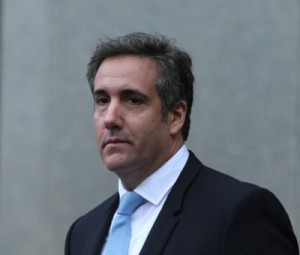Before working for Trump, lawyer Michael Cohen also invested in taxi medallions and real estate

Michael Cohen/Shutterstock.com.
President Donald Trump’s personal lawyer, Michael Cohen, was a personal injury lawyer before working for the Trump Organization, but it wasn’t his only career.
Cohen was “a hard-edge personal-injury attorney and businessman” who “often operated in the backwaters of the financial and legal worlds,” the New York Times reports. “Now a significant portion of his quarter-century business record is under the microscope of federal prosecutors—posing a potential threat not just to Mr. Cohen but also to the president.”
The article points out that Cohen has not been charged with any crimes, though some of his associates have faced criminal charges or regulatory penalties. He responded to a series of questions by the Times with a text telling the newspaper, “You need to do real fact checking as your questions are totally inaccurate.”
Among Cohen’s businesses:
• Cohen had a “seemingly charmed touch as a real estate investor,” the Times reports. One day in 2014, limited liability companies connected to Cohen sold four Manhattan buildings in cash transactions for $32 million— nearly three times more than the purchase price three years earlier. The Times credits McClatchy with first reporting the transactions. Trump has said that he became aware of Cohen after the lawyer began buying properties in Trump buildings.
• Cohen bought taxi medallions, following the example of his father-in-law, Fima Shusterman, who began buying the medallions after he came to the United States from Ukraine and initially found work as a cab driver. Cohen borrowed from banks to build up an inventory that reached 30 medallions once worth about $250,000 each. The value has fallen amid competition from ride-sharing services, but Cohen has used the medallions as collateral to borrow money, according to the Times.
Shusterman pleaded guilty in 1993 to evading federal reporting requirements for large cash transactions. Two of Cohen’s taxi partners “had a history of legal run-ins,” the Times reported. They each agreed to pay more than $1 million for overcharging drivers. One also agreed to pay a fine of nearly $1 million for operating unauthorized taxis. The other has been charged with failing to pay $5 million in taxes through use of offshore trusts and is awaiting trial.
• Since 2012, Cohen loaned $6 million to a Ukrainian immigrant and taxi operator with “a checkered financial record and a history of defaulting on loans,” according to the Times. The businessman, who recently entered the marijuana cultivation business, offered collateral that appeared to be worth less than the loan value.
• Cohen set up several companies in New York City, including two medical practices, an acupuncture office and two medical billing companies. It’s unclear whether he had any involvement beyond registering the companies. Two doctors listed in incorporation papers were accused of insurance fraud, including a doctor who pleaded guilty to scheming to defraud after his indictment in an alleged phony accident scheme. Charges against the other doctor were dropped.
• Cohen was a minority owner of the El Caribe catering hall in Brooklyn that was also owned by his uncle, a doctor who provided care to the Lucchese crime family, according to an FBI affidavit from 1993.
Cohen’s first job after graduating from Thomas M. Cooley Law School in 1991 was working for Melvyn J. Estrin. Cohen left the law firm in 1995, the same year Estrin was accused in a scheme to bribe insurance adjusters to inflate damage estimates.
Cohen then ran his own personal injury practice, sometimes working out of taxi offices. In one case, Cohen filed a lawsuit on behalf of a passenger who was accused of participating in a phony accident ring. She pleaded guilty to third-degree insurance fraud along with the driver of the vehicle that struck the one she was riding in.



